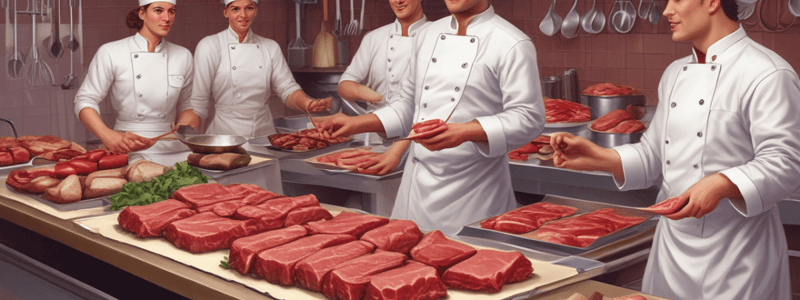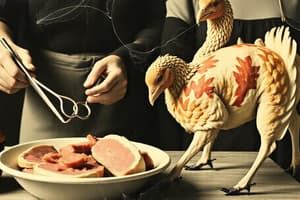Podcast
Questions and Answers
What does the medium-cooked meat feel like when squeezed?
What does the medium-cooked meat feel like when squeezed?
- It feels squishy and jellylike
- It has a strong feel to it and does not yield under pressure
- It feels mushy and yields to pressure (correct)
- It feels relatively hard and durable
Cooking time is solely determined by the weight of the meat and oven temperature.
Cooking time is solely determined by the weight of the meat and oven temperature.
False (B)
At what temperature is simmering typically done?
At what temperature is simmering typically done?
- 300°F to 350°F
- 350°F to 400°F
- 250°F to 300°F (correct)
- 150°F to 200°F
Why do bones affect cooking time?
Why do bones affect cooking time?
Meat cooked using moist heat is cooked to a specific internal temperature to indicate doneness.
Meat cooked using moist heat is cooked to a specific internal temperature to indicate doneness.
What is the primary function of gelatine in cooking?
What is the primary function of gelatine in cooking?
Fat works as a ______________________ in roasting.
Fat works as a ______________________ in roasting.
The traditional way to determine doneness of meat is to pierce the meat with a ______________.
The traditional way to determine doneness of meat is to pierce the meat with a ______________.
Match the following cooking times with their corresponding characteristics:
Match the following cooking times with their corresponding characteristics:
What affects the tenderness of meat?
What affects the tenderness of meat?
What is the main factor in determining cooking time?
What is the main factor in determining cooking time?
Why do roasting charts based on personal experience and judgment tend to be more accurate?
Why do roasting charts based on personal experience and judgment tend to be more accurate?
Match the following factors with their effects on juiciness of meat:
Match the following factors with their effects on juiciness of meat:
Basting with stock and searing meat can seal in the juices.
Basting with stock and searing meat can seal in the juices.
A thorough roasting chart that accounts for all variables would be impractically large.
A thorough roasting chart that accounts for all variables would be impractically large.
What happens to protein as it coagulates or cooks?
What happens to protein as it coagulates or cooks?
What happens to the proteins in meat when it is considered 'done' using dry-heat cooking?
What happens to the proteins in meat when it is considered 'done' using dry-heat cooking?
Meat cooked using a moist-heat method is always rare.
Meat cooked using a moist-heat method is always rare.
What is the optimal range of doneness for diners who prefer no pink in their pork?
What is the optimal range of doneness for diners who prefer no pink in their pork?
Dry-heat cooking is intended to obtain the necessary degree of doneness while keeping natural _______________ and juiciness intact.
Dry-heat cooking is intended to obtain the necessary degree of doneness while keeping natural _______________ and juiciness intact.
What determines the degree of doneness in meat?
What determines the degree of doneness in meat?
Connective tissue breakdown is a crucial aspect of dry-heat cooking.
Connective tissue breakdown is a crucial aspect of dry-heat cooking.
What is the primary difference between dry-heat and moist-heat cooking methods?
What is the primary difference between dry-heat and moist-heat cooking methods?
Match the following types of meat with their typical color change during cooking:
Match the following types of meat with their typical color change during cooking:
Flashcards are hidden until you start studying
Study Notes
Doneness
- Definition of doneness varies depending on cooking method: dry heat or moist heat
- In dry heat, meat is considered "done" when proteins have coagulated to the proper degree, as indicated by internal temperature
- In moist heat, meat is considered "done" when connective tissues have broken down sufficiently for the flesh to be edible
Dry-Heat Cooking
- Intended to achieve necessary degree of doneness while keeping natural softness and juiciness intact
- Degree of doneness is determined by protein coagulation and internal temperature
Degree of Doneness
- Red meat (beef, lamb, and mutton) changes color from red to pink to grey or grey-brown as it cooks
- Rare: browned exterior with a thin layer of cooked meat; red inside
- Medium: thicker grey layer; pink inside
- Well: grey throughout
- White meat (pork) changes color from pink or grey-pink to white or off-white
- Optimal range of doneness for pork: 71°C to 77°C
Testing Doneness
- Determining doneness is a crucial component of meat preparation
- Traditional way to determine doneness is to pierce the meat with a meat fork
- Meat is done when the fork prongs easily slip in and out
Moist-Heat Cooking
- Meat is cooked well done and beyond well done
- Tenderness, not temperature, indicates doneness
- Low temperatures, no higher than simmering, are required to prevent protein toughening
- Simmering normally requires an oven temperature of 250°F to 300°F (120°C to 150°C)
Juiciness
- Three major elements influence juiciness: internal fat, gelatine, and protein coagulation
- Internal fat makes meat taste juicier
- Gelatine, derived from connective tissue, aids in binding water molecules and retaining them in the meat
- Protein coagulation breaks down and loses water as it cooks, leading to moisture loss
Touch
- Rare: feels soft and squishy, yields to pressure
- Medium: feels relatively hard and durable, springs back quickly
- Well done: has a strong feel, does not yield under pressure
Time-Weight Ratio
- Many charts show roasting times per kilo of meat, but these are only estimates
- Cooking time is determined by many factors other than weight and oven temperature, including meat temperature, fat cover, bones, oven size, and cut shape
- Roasting time charts may not be accurate, and experience and judgment are required
Studying That Suits You
Use AI to generate personalized quizzes and flashcards to suit your learning preferences.




